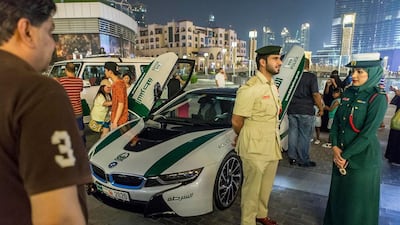As the peak holiday season gets under way and New Year’s Eve approaches tourism police are urging holiday makers to pay heed to the UAE’s culture and rules.
“Most problems facing tourists are related to misunderstandings, lack of knowledge about the country’s culture and rules and linguistic barriers,” said Maj Mousa Mubarak, acting director of the Tourism Security Department at Dubai Police.
From January to September 2017, 11.58 million tourists visited Dubai and police are preparing for more than 1.5 million to converge for New Year's celebrations in Downtown Dubai.
Maj Mubarak said incidents involving tourists are often not serious and involve problems with shop holders, hotel workers or taxi drivers. “Those issues are considered minor and solved on the spot,” said Maj Mubarak, adding that the 53 police officers on the tourism force speak at least seven languages, including German, Italian and Chinese.
Over the last eleven months, Dubai’s tourism police have dealt with 1,623 complaints including some high-profile cases. In one such case, which received international media attention earlier this year, Jamie Harron, 27, a tourist from Scotland, was accused of drunkenly touching a businessman in a bar in Barsha Heights, Dubai. He was sentenced to three months in jail after being convicted for public indecency and was told he faced further court proceedings for drinking alcohol and allegedly swearing at the man he touched.
Mr Harron's case was later dropped due to a special order from Sheikh Mohammed bin Rashid al Maktoum, Prime Minister and Ruler of Dubai.
In another incident this year, British IT worker Jamil Ahmed Mukadam, 23, was arrested at immigration while entering the UAE and accused of flashing his finger at a motorist from a hire car on a separate visit to Dubai earlier in the year. No updates are available on the current progress of the case.
To combat potential issues, there are already awareness campaigns and thousands of brochures and booklets have been distributed to tourists and visitors arriving in the country. Emirates and flydubai flights show awareness videos explaining acceptable and non-acceptable behaviours in the country.
It is not acceptable to drink and drive in the UAE – the country has a zero-tolerance policy. Drugs are strictly forbidden. Using offensive language or not respecting a religion is also not acceptable.
Maj Mubarak encouraged tourists to download the Dubai Police app – available on Apple and Android – where they can ask questions about the law and acceptable behaviour before they travel to the country.
Among the cases that tourism police dealt with in 2017, a European woman of Asian descent in her late 40s claimed that a bag containing precious belongings was stolen from her while she was at Al Hebab desert tourism camp. According to Dubai Police, the woman said the lost bag contained a large amount of money and gold items.
“In a few cases, people claimed they lost their luggage and precious belongings in an effort to get compensation through travel insurance,” said Maj Mubarak. He said that police launched investigations into the woman’s claims and found that she had provided false information. “The next day, she contacted police and found the bag,” he said.
If tourists do experience problems, the work does not stop for Dubai Police once visitors return home. A total of 418 problems related to tourists were solved after tourists returned back to their home countries this year. These problems include lost mobile phones.
_______________
Read more:
Google reveals UAE's most popular travel search queries
Dubai to attempt world record with New Year's Eve light show extravaganza at Burj Khalifa
Light show to take centre stage at Downtown Dubai’s New Year extravaganza
_______________
One British woman, who forgot a Dh100,000 Rolex watch in a Dubai hotel room, received extra-special treatment when she had it returned nine months later to her by officers visiting Britain to attend a conference.
Travelers are urged to contact Dubai police to report lost and found items, and Maj Mubarak also urged tourists to make accommodation bookings as well as hire motor vehicles and tourist guides through official channels. “We have noticed that tourists are misled by unlicensed tourist guides and renting unlicensed motorcycle.”
Maj Mubarak stressed that the majority of cases lodged to tourism police involved “solving hotel booking problems, financial disputes and misunderstandings.”

